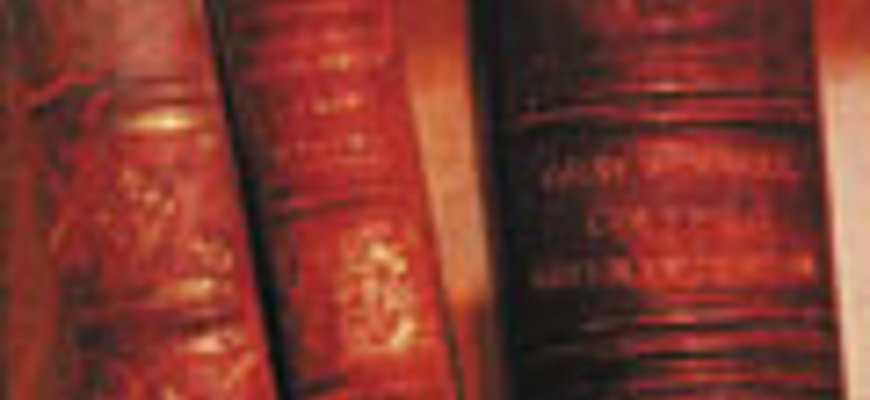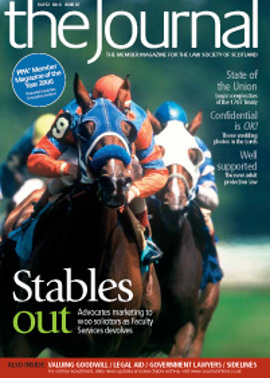Book reviews

Joe Thomson
PUBLISHER: TOTTELISBN: 1 84592 286 7
PRICE: £42
The physical transformation of this well-established text is a neat metaphor for the very real transformation which family law has experienced since the previous edition in 2002. Tottel, the new publishers, have provided a decidedly better format – larger font and a clear, fresh layout across 442 pages – that well serves an informed and engaging commentary.
The “real transformation” was the Civil Partnership Act 2004, which has entailed a significant reorganisation of at least the first eight chapters. In his Introduction to the fourth edition Professor Thomson explained that “although it is under considerable strain, the traditional taxonomy of the subject should not yet be jettisoned. Accordingly, the law of husband and wife remains the starting point of this study”. Four years later, the fifth edition is a study “of three legal regimes, viz marriage, civil partnership and cohabitation (whether opposite or same sex)”.
It is a mark of the author’s fluent style that this rapid regime-change has been accommodated so seamlessly. Practitioners and others familiar with the book will be pleased to find that Professor Thomson has incorporated reference to civil partnerships or cohabitation within the existing chapter structure. There is one completely new chapter, “Cohabitants”, which details the main provisions affecting heterosexual and same-sex partners, often introduced by the Family Law (Scotland) Act 2006. Other major legislative changes considered are the Gender Recognition Act 2004, and the then Adoption and Children (Scotland) Bill. The accessible and expert analysis associated with Joe Thomson’s scholarship is in evidence throughout.
The emphasis is firmly on Scots law, as one would expect. But one wonders whether in the future Scots family law will be more influenced by developments in Europe towards harmonisation, as well as by further challenges under the Human Rights Act. In regard to the latter, significant cases such as Salguiero da Silva Mouta v Portugal (2001), Goodwin v UK (2002), and B and L v UK (2004) are discussed, but family law has not produced as many challenges as some commentators expected. Civil partnerships will no doubt generate their own specific set of contested issues, and we can look forward to lively discussion about these indue course.
Fiona E Raitt, University of Dundee
J C Cummins
PUBLISHER: W GREENISBN: 0 414 01657 6
PRICE: £54
The process of review of liquor licensing legislation in Scotland was launched by the appointment in 2001 of the committee under Sheriff Principal Gordon Nicholson QC.
The legislation that committee spawned was mauled by the political process to create a finished article often bearing little resemblance to the original recommendations, as graphically described by Tom Johnston (Journal, January 2006, p 42). The clock is now ticking – at a frightening speed – to its final implementation. The Act represents a root and branch overhaul of the law, removing entirely the 1976 Licensing Act and its wealth of judicial interpretation, which left little scope for doubt as to its meaning.
That clarity will be replaced with the uncertainty that always accompanies new legislation. Such is the prospect at the timely launch of Jack Cummins’ comprehensive book. The author combines his unique experience as an academic, a member of the Nicholson Committee and a leading practising licensing lawyer to chronicle the social thinking and legislative history which brought about the evolution of licensing law into its new form. He explains the transitional provisions intended to avoid a repetition in Scotland of the chaos in England and Wales a couple of years ago, when an apathetic trade and an overburdened legal profession were ill prepared for similar radical legislation.
The book contains a full copy of the Act, although mine has at p 211 what purports to be an index but which clearly relates to some unidentified agricultural code. If it is the publishers’ intention to invite readers to participate in some form of competition to name the legislation in question, there is no indication of the conditions of entry.
The author is in no way responsible for this obvious error. But he carries complete responsibility for the very full section-by-section commentary, and for highlighting many of the anomalies and inconsistencies which are likely to trigger off appeals and judicial reviews. In summary this book is a must for all who are involved in any way with liquor licensing law in Scotland, in public or private sector, and whether as a specialist or as an honorary secretary of the local golf club.
Douglas Dalgleish, Brunton Miller
In this issue
- Court plans with little appeal
- Winning ways
- Forward steps
- Bar to progress
- Dean urges solicitors to stay with fee scheme
- The Union and the law
- Public and confidential
- Adult support: a new generation
- Advice deserts and PDSOs
- Vision 20:20
- Benevolent Fund: a much valued support
- Termites in the basement
- The value of goodwill
- Letters of Engagement Roadshow
- A door almost shut
- Lessons in improvements
- Null from the outset?
- The Tevez affair
- Scottish Solicitors' Discipline Tribunal
- Website reviews
- Book reviews
- Held in check
- Possession undisturbed






